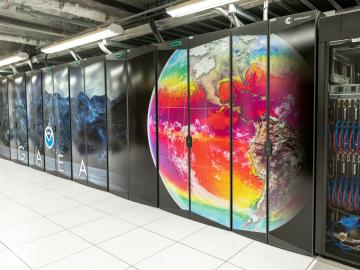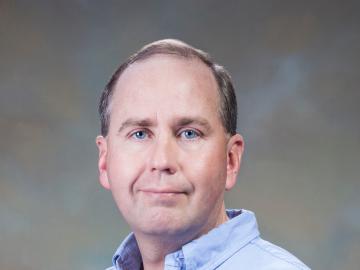
Filter News
Area of Research
- (-) Electricity and Smart Grid (1)
- (-) Supercomputing (114)
- Advanced Manufacturing (7)
- Biology and Environment (63)
- Biology and Soft Matter (1)
- Computational Biology (2)
- Computational Engineering (3)
- Computer Science (8)
- Energy Science (124)
- Fuel Cycle Science and Technology (1)
- Functional Materials for Energy (1)
- Fusion and Fission (34)
- Fusion Energy (13)
- Isotope Development and Production (1)
- Isotopes (27)
- Materials (114)
- Materials Characterization (1)
- Materials for Computing (19)
- Materials Under Extremes (1)
- Mathematics (1)
- National Security (31)
- Neutron Science (38)
- Nuclear Science and Technology (40)
- Nuclear Systems Modeling, Simulation and Validation (2)
- Sensors and Controls (1)
- Transportation Systems (2)
News Topics
- (-) Advanced Reactors (1)
- (-) Artificial Intelligence (37)
- (-) Frontier (32)
- (-) High-Performance Computing (43)
- (-) Isotopes (2)
- (-) Materials Science (16)
- (-) Nuclear Energy (4)
- (-) Security (6)
- (-) Transportation (6)
- 3-D Printing/Advanced Manufacturing (5)
- Big Data (22)
- Bioenergy (9)
- Biology (11)
- Biomedical (17)
- Biotechnology (2)
- Buildings (4)
- Chemical Sciences (5)
- Computer Science (96)
- Coronavirus (14)
- Critical Materials (3)
- Cybersecurity (8)
- Energy Storage (8)
- Environment (22)
- Exascale Computing (26)
- Fusion (1)
- Grid (7)
- Machine Learning (15)
- Materials (15)
- Mathematics (2)
- Microelectronics (1)
- Microscopy (7)
- Molten Salt (1)
- Nanotechnology (11)
- National Security (8)
- Neutron Science (13)
- Partnerships (1)
- Physics (8)
- Polymers (2)
- Quantum Computing (20)
- Quantum Science (25)
- Simulation (16)
- Software (1)
- Space Exploration (3)
- Summit (43)
Media Contacts

Researchers at ORNL have developed a machine-learning inspired software package that provides end-to-end image analysis of electron and scanning probe microscopy images.

A team of researchers from ORNL was recognized by the National Cancer Institute in March for their unique contributions in the fight against cancer.

Using disinformation to create political instability and battlefield confusion dates back millennia. However, today’s disinformation actors use social media to amplify disinformation that users knowingly or, more often, unknowingly perpetuate. Such disinformation spreads quickly, threatening public health and safety. Indeed, the COVID-19 pandemic and recent global elections have given the world a front-row seat to this form of modern warfare.

Oak Ridge National Laboratory, in partnership with the National Oceanic and Atmospheric Administration, is launching a new supercomputer dedicated to climate science research. The new system is the fifth supercomputer to be installed and run by the National Climate-Computing Research Center at ORNL.
Xiao Wang, a research scientist at ORNL, has been named a senior member of the Institute of Electrical and Electronics Engineers, the world’s largest organization for technical professionals. Wang works in the lab’s Computing and Computational Sciences Directorate’s Advanced Computing for Health Sciences Section.

ORNL has named Michael Parks director of the Computer Science and Mathematics Division within ORNL’s Computing and Computational Sciences Directorate. His hiring became effective March 13.

ORNL’s next major computing achievement could open a new universe of scientific possibilities accelerated by the primal forces at the heart of matter and energy.

Laboratory Director Thomas Zacharia presented five Director’s Awards during Saturday night's annual Awards Night event hosted by UT-Battelle, which manages ORNL for the Department of Energy.

ORNL researchers are deploying their broad expertise in climate data and modeling to create science-based mitigation strategies for cities stressed by climate change as part of two U.S. Department of Energy Urban Integrated Field Laboratory projects.

Gang Seob “GS” Jung has known from the time he was in middle school that he was interested in science.


